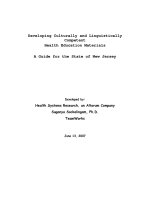freebsd device drivers [electronic resource] a guide for the intrepid
Bạn đang xem bản rút gọn của tài liệu. Xem và tải ngay bản đầy đủ của tài liệu tại đây (8.04 MB, 353 trang )
FREEBSD DEVICE DRIVERS
FREEBSD DEVICE
DRIVERS
A Guide
for the Intrepid
by Joseph Kong
San Francisco
FREEBSD DEVICE DRIVERS. Copyright © 2012 by Joseph Kong.
All rights reserved. No part of this work may be reproduced or transmitted in any form or by any means, electronic or
mechanical, including photocopying, recording, or by any information storage or retrieval system, without the prior
written permission of the copyright owner and the publisher.
16 15 14 13 12 1 2 3 4 5 6 7 8 9
ISBN-10: 1-59327-204-9
ISBN-13: 978-1-59327-204-3
Publisher: William Pollock
Production Editor: Alison Law
Cover and Interior Design: Octopod Studios
Developmental Editor: William Pollock
Technical Reviewer: John Baldwin
Copyeditor: Damon Larson
Compositor: Susan Glinert Stevens
Proofreader: Ward Webber
Indexer: BIM Indexing & Proofreading Services
For information on book distributors or translations, please contact No Starch Press, Inc. directly:
No Starch Press, Inc.
38 Ringold Street, San Francisco, CA 94103
phone: 415.863.9900; fax: 415.863.9950; ; www.nostarch.com
Library of Congress Cataloging-in-Publication Data
A catalog record of this book is available from the Library of Congress.
No Starch Press and the No Starch Press logo are registered trademarks of No Starch Press, Inc. Other product and
company names mentioned herein may be the trademarks of their respective owners. Rather than use a trademark
symbol with every occurrence of a trademarked name, we are using the names only in an editorial fashion and to the
benefit of the trademark owner, with no intention of infringement of the trademark.
The information in this book is distributed on an “As Is” basis, without warranty. While every precaution has been
taken in the preparation of this work, neither the author nor No Starch Press, Inc. shall have any liability to any
person or entity with respect to any loss or damage caused or alleged to be caused directly or indirectly by the
information contained in it.
This book is dedicated to the FreeBSD community.
BRIEF CONTENTS
About the Author and the Technical Reviewer xvii
Foreword by John Baldwin xix
Acknowledgments xxi
Introduction xxiii
Chapter 1: Building and Running Modules 1
Chapter 2: Allocating Memory 17
Chapter 3: Device Communication and Control 27
Chapter 4: Thread Synchronization 53
Chapter 5: Delaying Execution 83
Chapter 6: Case Study: Virtual Null Modem 99
Chapter 7: Newbus and Resource Allocation 113
Chapter 8: Interrupt Handling 125
Chapter 9: Case Study: Parallel Port Printer Driver 141
Chapter 10: Managing and Using Resources 165
Chapter 11: Case Study: Intelligent Platform Management Interface Driver 183
Chapter 12: Direct Memory Access 193
viii Brief Contents
Chapter 13: Storage Drivers 207
Chapter 14: Common Access Method 225
Chapter 15: USB Drivers 257
Chapter 16: Network Drivers, Part 1: Data Structures 283
Chapter 17: Network Drivers, Part 2: Packet Reception and Transmission 299
References 309
Index 311
CONTENTS IN DETAIL
ABOUT THE AUTHOR AND THE TECHNICAL REVIEWER xvii
FOREWORD by John Baldwin xix
ACKNOWLEDGMENTS xxi
INTRODUCTION xxiii
Who Is This Book For? xxiii
Prerequisites xxiv
Contents at a Glance xxiv
Welcome Aboard! xxv
1
BUILDING AND RUNNING MODULES 1
Types of Device Drivers 1
Loadable Kernel Modules 2
Module Event Handler 2
DECLARE_MODULE Macro 3
Hello, world! 5
Compiling and Loading 6
Character Drivers 7
d_foo Functions 7
Character Device Switch Table 8
make_dev and destroy_dev Functions 9
Mostly Harmless 10
echo_write Function 12
echo_read Function 13
echo_modevent Function 14
DEV_MODULE Macro 15
Don’t Panic 15
Block Drivers Are Gone 15
Conclusion 16
2
ALLOCATING MEMORY 17
Memory Management Routines 17
malloc_type Structures 19
MALLOC_DEFINE Macro 19
MALLOC_DECLARE Macro 20
x Contents in Detail
Tying Everything Together 20
Contiguous Physical Memory Management Routines 22
A Straightforward Example 23
Conclusion 25
3
DEVICE COMMUNICATION AND CONTROL 27
ioctl 28
Defining ioctl Commands 29
Implementing ioctl 30
echo_write Function 34
echo_set_buffer_size Function 35
echo_ioctl Function 36
echo_modevent Function 36
Don’t Panic 37
Invoking ioctl 37
sysctl 40
Implementing sysctls, Part 1 41
sysctl Context Management Routines 44
Creating Dynamic sysctls 44
SYSCTL_STATIC_CHILDREN Macro 47
SYSCTL_CHILDREN Macro 47
Implementing sysctls, Part 2 47
sysctl_set_buffer_size Function 50
Don’t Panic 52
Conclusion 52
4
THREAD SYNCHRONIZATION 53
A Simple Synchronization Problem 54
A More Complex Synchronization Problem 54
race_new Function 58
race_find Function 58
race_destroy Function 59
race_ioctl Function 59
race_modevent Function 60
The Root of the Problem 61
Preventing Race Conditions 65
Mutexes 65
Spin Mutexes 65
Sleep Mutexes 66
Mutex Management Routines 66
Implementing Mutexes 68
race_modevent Function 71
Don’t Panic 72
Shared/Exclusive Locks 73
Shared/Exclusive Lock Management Routines 73
Implementing Shared/Exclusive Locks 75
Reader/Writer Locks 78
Reader/Writer Lock Management Routines 78
Contents in Detail xi
Condition Variables 79
Condition Variable Management Routines 80
General Guidelines 81
Avoid Recursing on Exclusive Locks 81
Avoid Holding Exclusive Locks for Long Periods of Time 82
Conclusion 82
5
DELAYING EXECUTION 83
Voluntary Context Switching, or Sleeping 83
Implementing Sleeps and Condition Variables 85
sleep_modevent Function 88
load Function 89
sleep_thread Function 90
sysctl_debug_sleep_test Function 91
unload Function 91
Don’t Panic 92
Kernel Event Handlers 92
Callouts 94
Callouts and Race Conditions 96
Taskqueues 96
Global Taskqueues 97
Taskqueue Management Routines 97
Conclusion 98
6
CASE STUDY: VIRTUAL NULL MODEM 99
Prerequisites 100
Code Analysis 100
nmdm_modevent Function 103
nmdm_clone Function 104
nmdm_alloc Function 105
nmdm_outwakeup Function 106
nmdm_task_tty Function 106
nmdm_inwakeup Function 108
nmdm_modem Function 108
nmdm_param Function 109
nmdm_timeout Function 111
bits_per_char Function 111
Don’t Panic 112
Conclusion 112
7
NEWBUS AND RESOURCE ALLOCATION 113
Autoconfiguration and Newbus Drivers 113
device_foo Functions 114
Device Method Table 115
DRIVER_MODULE Macro 116
xii Contents in Detail
Tying Everything Together 117
foo_pci_probe Function 120
foo_pci_attach Function 120
d_foo Functions 121
foo_pci_detach Function 121
Don’t Panic 122
Hardware Resource Management 122
Conclusion 124
8
INTERRUPT HANDLING 125
Registering an Interrupt Handler 125
Interrupt Handlers in FreeBSD 126
Implementing an Interrupt Handler 127
pint_identify Function 132
pint_probe Function 132
pint_attach Function 133
pint_detach Function 134
pint_open Function 134
pint_close Function 135
pint_write Function 136
pint_read Function 136
pint_intr Function 137
Don’t Panic 138
Generating Interrupts on the Parallel Port 138
Conclusion 139
9
CASE STUDY: PARALLEL PORT PRINTER DRIVER 141
Code Analysis 141
lpt_identify Function 146
lpt_probe Function 146
lpt_detect Function 147
lpt_port_test Function 148
lpt_attach Function 148
lpt_detach Function 150
lpt_open Function 151
lpt_read Function 153
lpt_write Function 154
lpt_intr Function 156
lpt_timeout Function 158
lpt_push_bytes Function 158
lpt_close Function 159
lpt_ioctl Function 160
lpt_request_ppbus Function 162
lpt_release_ppbus Function 162
Conclusion 163
Contents in Detail xiii
10
MANAGING AND USING RESOURCES 165
I/O Ports and I/O Memory 165
Reading from I/O Ports and I/O Memory 166
Writing to I/O Ports and I/O Memory 167
Stream Operations 169
Memory Barriers 172
Tying Everything Together 172
led_identify Function 177
led_probe Function 177
led_attach Function 178
led_detach Function 178
led_open Function 179
led_close Function 180
led_read Function 180
led_write Function 181
Conclusion 182
11
CASE STUDY: INTELLIGENT PLATFORM
MANAGEMENT INTERFACE DRIVER 183
Code Analysis 183
ipmi_pci_probe Function 185
ipmi_pci_match Function 186
ipmi_pci_attach Function 187
ipmi2_pci_probe Function 189
ipmi2_pci_attach Function 189
Conclusion 191
12
DIRECT MEMORY ACCESS 193
Implementing DMA 194
Initiating a DMA Data Transfer 196
Dismantling DMA 196
Creating DMA Tags 197
Tearing Down DMA Tags 198
DMA Map Management Routines, Part 1 199
Loading (DMA) Buffers into DMA Maps 199
bus_dma_segment Structures 199
bus_dmamap_load Function 200
bus_dmamap_load_mbuf Function 201
bus_dmamap_load_mbuf_sg Function 201
bus_dmamap_load_uio Function 202
bus_dmamap_unload Function 202
DMA Map Management Routines, Part 2 202
A Straightforward Example 203
Synchronizing DMA Buffers 205
Conclusion 205
xiv Contents in Detail
13
STORAGE DRIVERS 207
disk Structures 207
Descriptive Fields 208
Storage Device Methods 209
Mandatory Media Properties 209
Optional Media Properties 209
Driver Private Data 210
disk Structure Management Routines 210
Block I/O Structures 210
Block I/O Queues 212
Tying Everything Together 213
at45d_attach Function 217
at45d_delayed_attach Function 218
at45d_get_info Function 219
at45d_wait_for_device_ready Function 220
at45d_get_status Function 220
at45d_strategy Function 221
at45d_task Function 221
Block I/O Completion Routines 223
Conclusion 223
14
COMMON ACCESS METHOD 225
How CAM Works 226
A (Somewhat) Simple Example 227
mfip_attach Function 234
mfip_detach Function 235
mfip_action Function 236
mfip_poll Function 238
mfip_start Function 238
mfip_done Function 240
SIM Registration Routines 242
cam_simq_alloc Function 242
cam_sim_alloc Function 242
xpt_bus_register Function 243
Action Routines 243
XPT_PATH_INQ 243
XPT_RESET_BUS 245
XPT_GET_TRAN_SETTINGS 246
XPT_SET_TRAN_SETTINGS 249
XPT_SCSI_IO 250
XPT_RESET_DEV 255
Conclusion 255
Contents in Detail xv
15
USB DRIVERS 257
About USB Devices 257
More About USB Devices 258
USB Configuration Structures 259
Mandatory Fields 260
Optional Fields 260
USB Transfer Flags 261
USB Transfers (in FreeBSD) 262
USB Configuration Structure Management Routines 264
USB Methods Structure 265
Tying Everything Together 266
ulpt_probe Function 270
ulpt_attach Function 271
ulpt_detach Function 273
ulpt_open Function 273
ulpt_reset Function 274
unlpt_open Function 275
ulpt_close Function 276
ulpt_ioctl Function 276
ulpt_watchdog Function 277
ulpt_start_read Function 277
ulpt_stop_read Function 278
ulpt_start_write Function 278
ulpt_stop_write Function 278
ulpt_write_callback Function 279
ulpt_read_callback Function 280
ulpt_status_callback Function 281
Conclusion 282
16
NETWORK DRIVERS, PART 1: DATA STRUCTURES 283
Network Interface Structures 283
Network Interface Structure Management Routines 286
ether_ifattach Function 287
ether_ifdetach Function 288
Network Interface Media Structures 289
Network Interface Media Structure Management Routines 289
Hello, world! 291
mbuf Structures 293
Message Signaled Interrupts 294
Implementing MSI 294
MSI Management Routines 297
Conclusion 297
xvi Contents in Detail
17
NETWORK DRIVERS, PART 2:
PACKET RECEPTION AND TRANSMISSION 299
Packet Reception 299
em_rxeof Function 300
em_handle_rx Function 303
Packet Transmission 304
em_start_locked Function 304
em_txeof Function 305
Post Packet Transmission 307
Conclusion 308
REFERENCES 309
INDEX 311
ABOUT THE AUTHOR
The author of Designing BSD Rootkits (No Starch Press), Joseph Kong works
on information security, operating system theory, reverse code engineering,
and vulnerability assessment. Kong is a former system administrator for the
city of Toronto.
ABOUT THE
TECHNICAL REVIEWER
John Baldwin has been working on various portions of the FreeBSD operat-
ing system for 12 years. His main areas of interest include SMP, PCI, ACPI,
and support for x86. He has served as a member of both the FreeBSD core
team and the release engineering team.
FOREWORD
While most portions of an operating system are main-
tained and developed by individuals who specialize in
a given operating system, device drivers are unique:
They’re maintained by a much broader spectrum of
developers. Some device driver authors have extensive
experience with a particular operating system, while others have detailed
knowledge of specific hardware components and are tasked with maintain-
ing device drivers for those components across multiple systems. Too, device
drivers are often somewhat self-contained, so that a developer can maintain
a device driver while viewing other parts of the system as a black box.
Of course, that black box still has an interface, and each operating system
provides its own set of interfaces to device drivers. Device drivers on all sys-
tems need to perform many common tasks, such as discovering devices, allo-
cating resources for connected devices, and managing asynchronous events.
However, each operating system has its own ways of dealing with these tasks,
and each differs in the interfaces it provides for higher-level tasks. The key
xx Foreword
to writing a device driver that is both robust and efficient lies in understand-
ing the specific details of the interfaces that the particular operating system
provides.
FreeBSD Device Drivers is an excellent guide to the most commonly used
FreeBSD device driver interfaces. You’ll find coverage of lower-level inter-
faces, including attaching to eligible devices and managing device resources,
as well as higher-level interfaces, such as interfacing with the network and
storage stacks. In addition, the book’s coverage of several of the APIs avail-
able in the kernel environment, such as allocating memory, timers, and syn-
chronization primitives, will be useful to anyone working with the FreeBSD
kernel. This book is a welcome resource for FreeBSD device driver authors.
John Baldwin
Kernel Developer, FreeBSD
New York
March 20, 2012
ACKNOWLEDGMENTS
No book is an island. You would not be holding this
book in your hands without the help and support of
a host of people to whom I am most grateful.
Foremost, thanks to Bill Pollock and the gang at No Starch Press for giv-
ing me the opportunity to write this book and for helping me along the way.
Special thanks to Alison Law, Riley Hoffman, and Tyler Ortman for pulling
things together. Alison, you deserve to be mentioned at least twice, if not
more. Thanks for entering corrections multiple times and for keeping me
on schedule (sort of). Thanks, too, to copyeditors Damon Larson and Megan
Dunchak and to Jessica Miller for writing the back cover copy.
I couldn’t have done this without John Baldwin’s excellent technical
review. He patiently answered all of my (inane) questions and helped to
improve my code. To my brother, Justin Kong, thank you for reviewing this
book multiple times. You definitely deserve the “Iron Man” award. Thanks
to Aharon Robbins for his review and to my friend Elizabeth C. Mitchell for
drawing my diagrams (and for baking me brownies). And thanks to George
Neville-Neil and Michael W. Lucas for your advice.
xxii Acknowledgments
Thanks, Dad, for lending me your expertise on hardware and for lend-
ing me actual hardware, which made it possible for me to write this book.
Thanks, Mom, for your love and support. I know you pray for me every day.
Thanks also go to my friends for their support.
And last but not least, thanks to the open source software and FreeBSD
communities for your willingness to share. Without you, I’d be a lousy pro-
grammer, and I’d have nothing to write about.
INTRODUCTION
Welcome to FreeBSD Device Drivers! The
goal of this book is to help you improve
your understanding of device drivers under
FreeBSD. By the time you finish this book,
you should be able to build, configure, and manage
your own FreeBSD device drivers.
This book covers FreeBSD version 8, the version recommended for pro-
duction use as of this writing. Nonetheless, most of what you’ll learn will apply
to earlier versions and should apply to later ones as well.
Who Is This Book For?
I wrote this book as a programmer, for programmers. As such, you’ll find a
heavy focus on programming, not theory, and you’ll examine real device
drivers (namely, ones that control hardware). Imagine trying to write a book
without ever having read one. Inconceivable! The same thing goes for device
drivers.
xxiv Introduction
Prerequisites
To get the most out of this book, you should be familiar with the C program-
ming language. You should also know something about operating system
design; for example, the difference between a process and a thread.
If you lack the necessary background, I recommend reading the follow-
ing three books prior to this one, or just keeping them around as references:
The C Programming Language, by Brian W. Kernighan and Dennis M. Ritchie
(Prentice Hall PTR, 1988)
Expert C Programming, by Peter van der Linden (Prentice Hall, 1994)
The Design and Implementation of the FreeBSD Operating System, by Marshall Kirk
McKusick and George V. Neville-Neil (Addison-Wesley Professional, 2005)
Contents at a Glance
FreeBSD Device Drivers contains the following chapters.
Chapter 1: Building and Running Modules
Provides an overview and introduction to basic device driver programming
concepts and terminology.
Chapter 2: Allocating Memory
Describes FreeBSD’s kernel memory management routines.
Chapter 3: Device Communication and Control
Teaches you how to communicate with and control your device drivers
from user space.
Chapter 4: Thread Synchronization
Discusses the problems and solutions associated with multithreaded pro-
gramming and concurrent execution.
Chapter 5: Delaying Execution
Describes delaying code execution and asynchronous code execution,
and explains why these tasks are needed.
Chapter 6: Case Study: Virtual Null Modem
Contains the first of several occasions where I walk you through a real-
world device driver.
Chapter 7: Newbus and Resource Allocation
Covers the infrastructure used by FreeBSD to manage the hardware devices
on the system. From here on, I deal exclusively with real hardware.
Chapter 8: Interrupt Handling
Discusses interrupt handling in FreeBSD.
Chapter 9: Case Study: Parallel Port Printer Driver
Walks through
lpt(4), the parallel port printer driver, in its entirety.
Chapter 10: Managing and Using Resources
Covers port-mapped I/O and memory-mapped I/O.


![cruising alaska [electronic resource] a guide to the ports of call.](https://media.store123doc.com/images/document/14/y/ba/medium_bal1401351374.jpg)
![cruising the mexican riviera and baja [electronic resource] a guide to the ships and the ports of call.](https://media.store123doc.com/images/document/14/y/pc/medium_pcm1401351395.jpg)
![violent python [electronic resource] a cookbook for hackers, forensic analysts, penetration testers and security engineers](https://media.store123doc.com/images/document/14/y/lt/medium_ltw1401378089.jpg)
![webbots, spiders, and screen scrapers [electronic resource] a guide to developing internet agents with phpcurl, second edition](https://media.store123doc.com/images/document/14/y/us/medium_usq1401378219.jpg)
![freebsd device drivers [electronic resource] a guide for the intrepid](https://media.store123doc.com/images/document/14/y/kb/medium_kbo1401382568.jpg)
![the mobile frontier [electronic resource] a guide for designing mobile experiences](https://media.store123doc.com/images/document/14/y/qr/medium_qrw1401383749.jpg)
![epub straight to the point [electronic resource] [creating ebooks for the apple ipad and other ereaders]](https://media.store123doc.com/images/document/14/ne/xs/medium_xsa1401589411.jpg)
